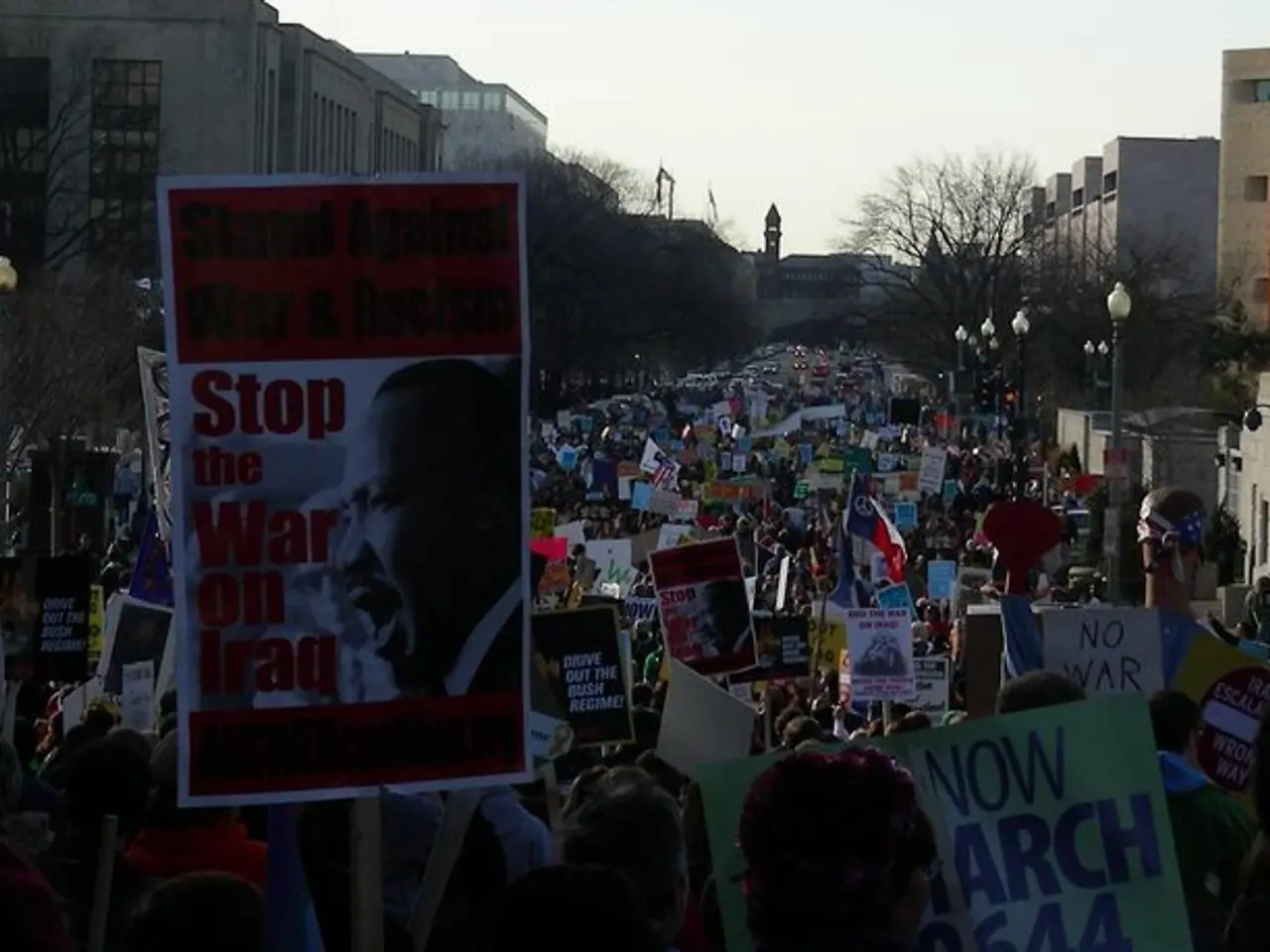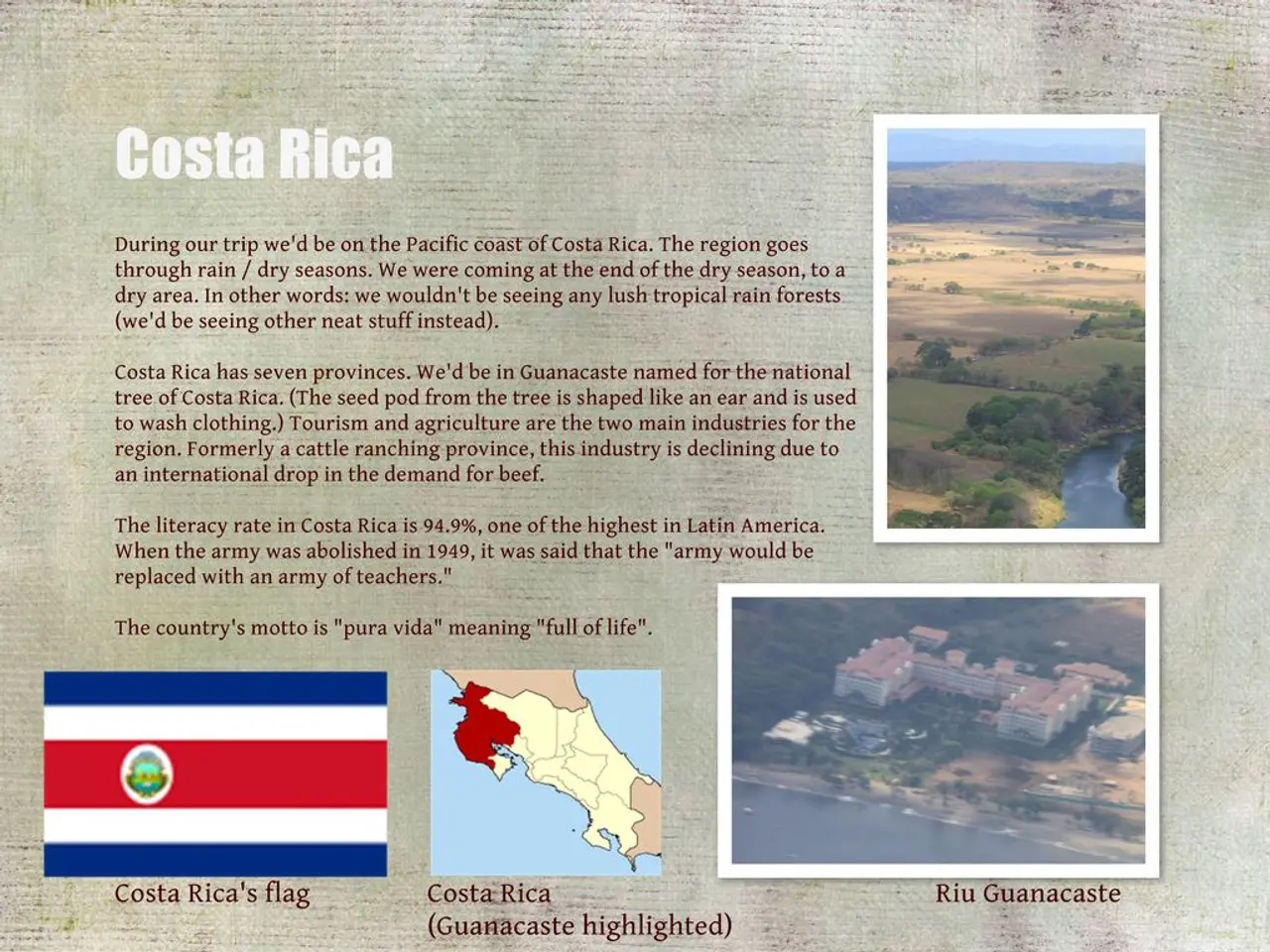Conflict in Gaza: Starvation Used as a Tactic in Armed Struggle
The Gaza Strip is currently grappling with a severe starvation crisis, as food consumption and nutrition indicators exceed famine thresholds according to multiple UN agencies [1][2][5]. Over 39% of Gaza's population, more than one in three people, are going days without eating, with around 500,000 people enduring famine-like conditions and the remainder at emergency hunger levels [1].
Acute malnutrition, especially in children under five, has surged sharply, reaching 16.5% in Gaza City and quadrupling in two months. Nearly 20,000 children have been treated for acute malnutrition, and malnutrition-related deaths, including of children, are sharply rising [1][2][4][3].
The food security situation is catastrophic due to the relentless conflict, destruction of 70% of Gaza's infrastructure, and a blockade prohibiting humanitarian aid entry. No UNRWA food, medicine, or essentials deliveries have been allowed for over five months, contributing to daily loss of lives [3][4].
The Integrated Food Security Phase Classification (IPC) has identified that two out of three famine indicators have been breached in Gaza: food consumption and acute malnutrition. The third indicator, deaths from malnutrition, appears to be rising but not yet globally confirmed at famine levels [1][2][5].
The aid restrictions include a near-total blockade and denial of access for humanitarian trucks by Israeli authorities, severely limiting the delivery and distribution of food, medical supplies, and other critical assistance [3][4].
The UN and IPC recommend urgent actions to end hostilities, allow safe, sustained humanitarian access, protect civilians and aid infrastructure, and restore humanitarian and commercial supply flows to address the crisis [5].
In a heart-wrenching image, a Gazan mother cradles her severely malnourished child, symbolising the deepening hunger crisis in Gaza. Naima, Yazan's mother, who is pregnant, prepared a meal of boiled eggplants to last them a few days. Several of Yazan's older siblings also looked thin and drained [6].
Dr. Asha Urooj, Chairperson and Professor of Food Science and Nutrition at the University of Mysore, explained that the duration of starvation and the stage of life are major determinants influencing the impact of starvation on a child's health [7].
Israel has been accused of using hunger as a weapon of war in Gaza, with the UN and rights experts accusing Israel of blocking humanitarian access and targeting aid routes in violation of international law [8].
The ongoing conflict and displacement, coupled with the Israeli military targeting aid sites and not allowing aid to enter certain areas, has caused the starvation crisis in Gaza to plummet to unprecedented levels [9].
The UN Secretary-General, António Guterres, called for a ceasefire, stating that "The trickle of aid must become an ocean" [9]. The US President Donald Trump also acknowledged the severity of the situation [10].
Francesca Albanese, the United Nations Special Rapporteur for the West Bank and Gaza, described the situation in Gaza as a "genocide" by Israel against Palestinians [11]. The image of emaciated children in Gaza and reports of dozens of hunger-related deaths have led to a shift in perceptions in Europe and around the world [12].
In conclusion, Gaza's population urgently requires massive food and nutrition aid interventions, but these are currently severely restricted by the ongoing blockade and conflict, driving a grave famine risk with critical malnutrition and starvation conditions worsening daily [1][2][3][5].
References: [1] https://www.un.org/sg/en/content/sg/statement/2021-08-03-secretary-general-calls-for-immediate-end-hostilities-and-unrestricted [2] https://www.wfp.org/news/un-agencies-warn-gaza-faces-deepening-starvation-crisis [3] https://www.unrwa.org/news/unrwa-calls-urgent-action-gaza-crisis [4] https://www.aljazeera.com/news/2021/8/3/gaza-crisis-un-warns-of-deepening-starvation-crisis-as-trump-breaks-silence [5] https://www.who.int/news-room/q-a-detail/q-a-on-the-situation-in-gaza [6] https://www.theguardian.com/world/2021/aug/05/gaza-starvation-crisis-deepens-as-us-and-un-call-for-ceasefire [7] https://www.thelancet.com/journals/lancet/article/PIIS0140-6736(21)01264-7/fulltext [8] https://www.hrw.org/news/2021/08/02/israel-gaza-blockade-starvation-crisis [9] https://www.reuters.com/world/middle-east/un-says-gaza-faces-deepening-starvation-crisis-as-trump-breaks-silence-2021-08-04/ [10] https://www.aljazeera.com/news/2021/8/28/trump-acknowledges-gaza-starvation-crisis-but-falls-short-of-condemning-israel [11] https://www.aljazeera.com/news/2021/8/3/un-official-calls-gaza-situation-genocide-as-trump-breaks-silence-on-crisis [12] https://www.aljazeera.com/news/2021/8/4/gaza-crisis-un-calls-for-immediate-end-to-hostilities-as-us-and-israel-face-mounting-pressure
- The severe starvation crisis in the Gaza Strip has led to an increase in chronic diseases and neurological disorders, as malnutrition-related deaths continue to rise.
- The lack of scientific research and medical-conditions awareness compounds the dire situation in Gaza, as people go days without food and proper nutrition.
- The ongoing political tension and war-and-conflicts in the region further impede efforts to address the starvation crisis, as both the UN and US press for a ceasefire.
- The deepening hunger crisis in Gaza highlights the urgent need for humanitarian aid and intervention in various sectors, including sports, which can contribute to the overall health and well-being of the population.
- Acknowledging the severity of the situation, recent general news reports have focused on the rising starvation rates in Gaza, bringing attention to the plight of the Gazan people and their exposure to famine-like conditions.
- The opinions of international leaders and rights experts regarding the situation in Gaza range from calling it a genocide to urging for immediate action to end hostilities and provide humanitarian aid, with the ultimate goal of preventing further chronic diseases and starvation among the population.








